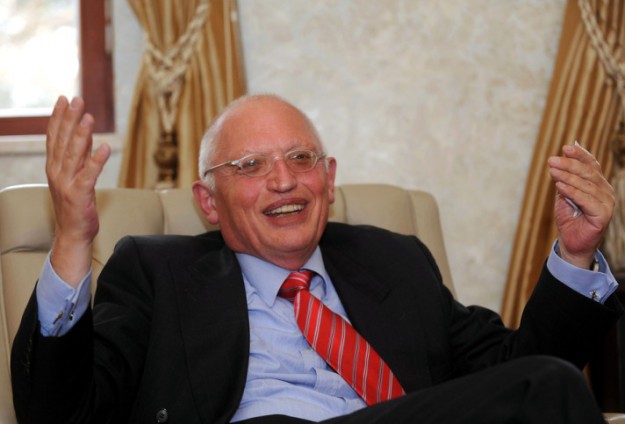Former EU Commissioner for Enlargement Gunter Verheugen said Gezi Park protests showed how democratic Turkey was, while he expects no change in German politics.
 Former EU Commissioner for Enlargement Gunter Verheugen said that Gezi Park protests showed how democratic Turkey was, as people went out the streets and expressed their wills.
Former EU Commissioner for Enlargement Gunter Verheugen said that Gezi Park protests showed how democratic Turkey was, as people went out the streets and expressed their wills.
Verheugen, who spoke to AA in Istanbul, said the current biggest obstacle before enlargement was the economic crisis in the EU. “Everybody is pre-occuppied with crisis management, people are losing confidence in European integration, so the leaders do not have such a big appetite to bear enlargement,” he said.
“Enlargement fatigue”
Listing the so-called “enlargement fatigue” as the main reason for the EU to stall accession of candidate countries, Verheugen explained its reason as the European leaders’ failure of not explaining the citizens that the enlargement round of 2004 and 2007 were successful both politically and economically.
Verheugen added, “They are simply not true that the enlargement is the reason for the multi-crisis in the union.”
Turkey, “the scapegoat”
As for Turkey’s accession, Verheugen said that there was a lack of strategic priority in the EU compared to the term that he was on duty between 1999 and 2004.
“There was a clear common agreement that the accession of Turkey is in the strongest interests of both sides during my term,” said Verheugen.
In response to the question of what changed afterwards, Verheugen said,” I think you can clearly define the day it happened. It happened when the referendum on the European constitution failed in France and in the Netherlands and when especially, the eventual accession of Turkey was made scapegoat.”
“I know that accession of Turkey was not decisive for the result of the referendum but it was used. Since then we have especially France and Germany who made it very clear that for cultural reasons they do not accept Turkey as part of the Union,” added Verheugen.
Expressing his despair about a perceptional change in this regard, Verheugen said, “Although Nicolas Sarkozy has gone, we still have the same situation in France, and Angela Merkel in Germany has the same position.”
No change in German politics
Upon the question whether there would be a change in German politics after the elections in September, “I do not expect that the policy in Germany will change after the elections, Merkel’s party will remain or has good chance to remain as the strongest party.” said Verheugen.
Cyprus, an issue of “substance”
Asked, to what extent Cyprus issue would be denominator for the future course of Turkey-EU relations, Verhuegen said, “Cyprus is an obstacle for the “process”, it is not really important, it is substance. If both Turkey and EU make a move to remove this obstacle, then that would make it very difficult for the opponents in Germany and France to continue with sabotage of the negotiations.”
“So my advice for Turkey,” added Verheugen, “would be to consider the opposition in the EU very well, and to examine what can be done to remove this obstacle.”
Gezi park protests, “normal” in democracies
In response to a question on how the Gezi Park events are perceived from Europe, Verheugen said, “It happens in other countries as well. So the only thing I can say is, we have to live with that, it is normal in democracy.”
In response to debates to compare the events to Arab Spring, Verheugen said, “This is nothing to do with Arab spring. On the contrary, it shows how democratic Turkey is, people go to the streets and express their will, what is wrong with that? If people are not satisfied, they can vote for another party.”
Verhuegen added, “If people use violence, then it is wrong, cannot be accepted. And also police intervention has to be balanced. Prime Minister Recep Tayyip Erdogan already said that he regrets the initial over-action and it will be examined.”
“I have not even considered to cancel my trip to Turkey for a second,” added Verheugen.















